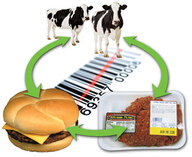FSMA 204 Resource Center
|
The finalization of the Food Safety Modernization Act (FSMA) Rule 204(d) is here. The goal of 204 is to create visibility within the supply chain to enable a better response to foodborne illnesses, contamination, and other public health and safety issues.
We support the FDA's Smarter Food Supply Chain Initiative to create a fully transparent supply chain that ensures safer food for all. Our goal is standards-based interoperability that benefits all supply chain participants by lowering the technological and financial barriers to adoption. Companies can’t afford to focus on their single link in the chain. The stakes are simply too high. This resource page is your guide to your traceability needs. Questions about traceability? We can help! |
When Does FMSA 204 Go into Effect?FSMA Rule 204 will go into effect in January 2023, 60 days after the final rule is published in November 2022. The FDA will give companies a period of two years to comply, so you will have until the year 2025 to become fully compliant. However, it is imperative for companies to start preparing now since vetting and implementing a food traceability solution takes time and careful consideration. If you wait until after the rule is published to start preparing, you may find it difficult to meet the 2025 deadline.
What are the FDA Food Traceability Requirements?If you grow, ship, pack, process, manufacture, or sell any of the foods on the Food Traceability List, you are required to keep additional records on these items. The FDA has defined a set of metrics called Key Data Elements (KDEs) that correspond to different events in the supply chain known as Critical Tracking Events (CTEs). The CTEs are:
It’s also important to note that the FDA has created a distinct role known as first receiver. A first receiver is defined as “the first person (other than a farm) who purchases and takes physical possession of a listed food.” The FDA clarifies that the first receiver role is designed to accommodate on-farm activities where product may be moved but not sold (e.g., sent to a cooler on the farm). In addition to capturing these KDEs, the FDA has outlined these requirements:
|
Expertise is a Click AwayACSIS, Inc.
Auto Data Corporation Avery Dennison BarTender by Seagull Scientific Digimarc Corporation EM Microelectronic - US FEIG Electronics, Inc. FLEXcon Golden State Foods GS1 Global GS1 US Impinj, Inc. Metalcraft Inc. NOVEXX Solutions USA Omron Microscan Systems OpsSmart PLM TrustLink SATO America SICK, Inc. Socket Mobile TEKLYNX Trustwell Wiliot, Inc. Zebra Technologies Corporation Read our FDA Public CommentsRead our comments to the FDA Docket FDA-2014-N-0053 Requirements for Additional Traceability Records for Certain Foods
Read our comments to the FDA Docket FDA-1995-N-0062 Food Standards Read our comments to the FDA Docket No. FDA-2019-N-4187 A New Era of Smarter Food Safety. Read our Position Statement on FSMA. |
Watch our
|


